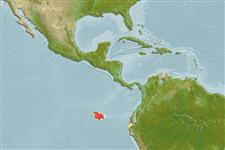مكسيني (hagfishes) >
Myxiniformes (Hagfishes) >
Myxinidae (Hagfishes) > Eptatretinae
Etymology: Eptatretus: hepta (Gr.), seven; tretos (Gr.), perforated (i.e., with holes), referring to seven gill apertures on what would later be described as Homea banksii (=E. cirrhatus) [range within genus is 6-14 pairs of gill apertures]. (See ETYFish); grouseri: In honor of McMillan’s son, David “Grouser” McMillan, a Chief Engineer in the U.S. Merchant Marine, for “continued encouragement” of Mom’s hagfish studies and for his knowledge and love of ships and the sea. (See ETYFish).
Environment: milieu / climate zone / depth range / distribution range
البيئة
بحري قاعية المعيشة; غير مهاجرة; نطاق العمق 648 - 722 m (Ref. 55621). Deep-water
Southeast Pacific: endemic in Galapagos Islands.
الحجم / وزن / العمر
Maturity: Lm ? range ? - ? cm
Max length : 37.8 cm TL ذكر/ مختلط الجنس; (Ref. 31788)
وصف مختصر
مفاتيح التعريف | الوصف الخارجي | قياسات المظهر الخارجي
This species is distinguished from its congeners except E. aceroi, E. profundus, E. wandoensis, E. wayuu by the number of gill apertures arranged in a straight line, 5 pairs (6 in one specimen of E. grouseri); 3/2 multicusp pattern of teeth; differs from these five-gilled congeners by having: total cusps 44-48 (vs. 58 in E. aceroi, 40-43 in E. wandoensis, 41-43 in E. wayuu); prebranchial pores 11-12 (vs. 44 in E. aceroi, 14-18 in E. wandoensis, 24 in E. wayuu); trunk pores 42-48 (vs. 107 in E. aceroi, 48-51 in E. profundus, 38-40 in E. wayuu); tail pores 13-15 (9-11 in E. wandoensis); total pores 71-79 (vs. 174 in E. aceroi, 81-86 in E. profundus) (Ref. 123790).
Life cycle and mating behavior
Maturities | التكاثر | Spawnings | Egg(s) | Fecundities | Larvae
Copulatory organ absent. The gonads of hagfishes are situated in the peritoneal cavity. The ovary is found in the anterior portion of the gonad, and the testis is found in the posterior part. The animal becomes female if the cranial part of the gonad develops or male if the caudal part undergoes differentiation. If none develops, then the animal becomes sterile. If both anterior and posterior parts develop, then the animal becomes a functional hermaphrodite. However, hermaphroditism being characterised as functional needs to be validated by more reproduction studies (Ref. 51361 ).
McMillan, C.B., 1999. Three new species of hagfish (Myxinidae, Eptatretus) from the Galápagos Islands. Fish. Bull. 97:110-117. (Ref. 31788)
IUCN Red List Status (Ref. 130435)
استخدامات بشرية
أدوات
تقارير خاصة
Download XML
مصادر علي الأنترنت
Estimates based on models
Preferred temperature (Ref.
123201): 6.9 - 11.2, mean 9.5 °C (based on 7 cells).
Phylogenetic diversity index (Ref.
82804): PD
50 = 0.5000 [Uniqueness, from 0.5 = low to 2.0 = high].
Bayesian length-weight: a=0.00204 (0.00092 - 0.00452), b=2.93 (2.73 - 3.13), in cm total length, based on LWR estimates for this (Sub)family-body shape (Ref.
93245).
مستوى غذائي (Ref.
69278): 4.1 ±0.7 se; based on size and trophs of closest relatives
المرونه (Ref.
120179): منخفض, الحد الزمني الأدني لتضاعف عدد أفراد المجتمع 4.5-14 سنة (Fec assumed to be <100).
Fishing Vulnerability (Ref.
59153): Low to moderate vulnerability (28 of 100).
